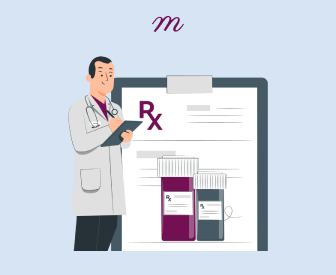Have your progress notes written for you automatically
In the mental health field, the term ‘prognosis’ refers to a prediction of the course, duration, severity, and outcome of a mental health condition. A prognosis can be given before treatment begins, so the client can weigh the benefits of different treatment options. The prognosis may also include a prediction of improvement reached at different intervals during the course of treatment.
A prognosis is different from a diagnosis, which identifies the mental health condition associated with a set of symptoms. People often confuse these terms, and the primary difference between the two is that while a prognosis is a guess as to treatment outcome, a diagnosis actually identifies the problem and gives it a name. In simple terms, a prognosis is a prediction while a diagnosis states what’s evident.
When making a prognosis, mental health professionals attempt to predict:
- how long symptoms will last.
- the likely outcome.
- how the condition and symptoms will change or progress.
- whether symptoms will improve, worsen, or remain the same.
- potential complications.
- impact on quality of life.
How a Prognosis Is Determined
Mental health professionals may rely on statistics to make a prognosis about mental health disorders. In addition, psychological assessments, diagnostic criteria, and symptom severity checklists can influence how a client’s prognosis is determined.
Several factors can affect a client’s prognosis, including the following parameters.
- Age at onset. With some mental health conditions, early onset may predict worse outcomes.
- Sex and gender identity. Some mental health conditions affect men and women differently.
- Medical history/comorbidities. Some clients may have more than one mental health condition, which complicates diagnosis, therapeutic interventions utilized, the course the conditions take, and outcomes.
- Type and severity of symptoms. Indicates the current level of distress and functional impairment, which are key factors in predicting the course of the condition.
- Nature and duration of symptoms. The presence of some symptoms may indicate a more severe course going forward. Symptoms present for a longer duration may indicate the condition will be persistent.
- Treatment response. If past treatments fail or if the current treatment doesn’t produce an adequate response, it might indicate a worse prognosis.
- Social support. Clients that have stable and healthy interpersonal relationships tend to have better outcomes.
Types of Prognoses
The following categories are generally used:
- Excellent indicates there is a strong likelihood the client will fully recover with minimal negative impacts on their daily functioning and quality of life.
- Good implies the client has a good chance of responding well to treatment and will have a good quality of life in the future.
- Fair indicates the client may have some response to treatment, but their condition will likely have a notable impact on their daily functioning and quality of life.
- Poor indicates the client’s condition is unlikely to improve and quality of life will be significantly impacted.
- Guarded means the mental health professional doesn’t have enough information to predict the outcome.
Why Prognosis Is Important
Understanding prognosis can be important for many reasons.
- Identifying an accurate prognosis helps clients feel informed.
- A base level is determined for future treatment decisions.
- Clients can plan for their future.
- Clients experience less anxiety because they know what they may expect going forward.
- Treatment strategies can be better defined.
A prognosis may be provided prior to the start of treatment so the client and therapist can weigh the benefits of different options, as it’s possible the treatment modalities utilized may impact the prognosis.
Providing a prognosis is an essential element of the therapeutic process. An accurate prognosis
- guides treatment planning.
- offers hope to clients struggling with mental health issues.
- helps mental health professionals make informed treatment decisions.
Formulating an accurate prognosis isn’t simple because it requires a combination of clinical expertise, empathy, and thorough assessment. An accurate mental health prognosis will help in the following ways.
1. Guide Treatment Planning. A prognosis offers a roadmap for the treatment process, allowing mental health professionals to determine the most appropriate interventions, set goals, and establish a recovery timeline.
2. Provide Hope and Clarity. An accurate prognosis offers clarity and hope for clients with mental health issues – they may feel reassured when they know what to expect and potential outcomes.
3. Inform Everyone Involved. Prognoses are valuable for communicating with clients, their families, and other professionals involved in the client’s care – ensuring everyone is on the same page regarding the client’s condition and the expected course of treatment.
4. Evaluate Progress. As treatment progresses, the prognosis serves as a benchmark for measuring improvement. Mental health professionals can then identify whether the treatment plan is effective or if adjustments are needed.
What Are the Components of a Mental Health Prognosis?
The prognosis must include various components to provide a comprehensive understanding of the client’s condition, including:
- an accurate diagnosis and/or clear description of presenting problems.
- a concise and clear statement that includes the expected course of the condition and potential outcomes, such as full recovery, partial improvement, or chronicity.
- a discussion of the factors that may influence the client’s prognosis: biological, psychological, social, and environmental (e.g., co-occurring medical conditions, social support, and access to resources).
- relevant assessment data, including information from clinical interviews, standardized assessments, and observations.
- treatment recommendations, such as types of evidence-based interventions, frequency, and duration.
- the reasoning behind the chosen prognosis and treatment recommendations.
- potential risks or challenges.
- clear treatment goals and objectives that are specific, measurable, achievable, relevant, and time-bound (i.e., SMART goals).
- a description of how progress will be monitored and evaluated throughout treatment.
Conducting a Thorough Assessment
Identifying an accurate prognosis lies in conducting a comprehensive assessment. This multifaceted process involves exploring various aspects of the client’s mental health. Below are some key elements to consider.
Clinical Interviews.
Conducting thorough clinical interviews is the cornerstone of the assessment process. Psychotherapists engage in open and empathic dialogues with clients, exploring the nature and history of their presenting problems, personal life experiences, and current functioning. Through active listening and thoughtful questioning, mental health professionals can gain valuable insights into the client’s feelings and thought processes. This qualitative data serves as a rich source of information, helping to create a holistic view of the client’s mental health.
Psychological Testing.
Testing adds an objective and standardized dimension to the assessment process. Psychological tests probe different facets of cognitive, emotional, and behavioral functioning, offering valuable data points that help identify underlying issues, clarify diagnostic criteria, and inform treatment planning. When choosing which tests to administer, psychotherapists consider the client’s specific needs, ensuring the results contribute to a more comprehensive understanding.
Biological Factors.
This step involves reviewing medical records to uncover any preexisting medical conditions or medication history that may have a bearing on the prognosis. Genetic factors are also considered, as they can predispose individuals to certain mental health conditions. Assessing co-occurring medical conditions is essential, as they can impact the course and treatment.
Psychosocial Assessment.
This assessment encompasses the client’s social and environmental context, including relationships, unique circumstances, family dynamics, living situations, and access to support systems. Since mental health is profoundly interconnected with these external factors, clinicians gain insight into how the client’s environment may be contributing to or mitigating their mental health challenges.
Functional Assessment.
This practical assessment involves the client’s daily functioning and any impairments stemming from their mental health condition, examining how the condition impacts their life, from work or education to relationships and self-care. By evaluating the level of impairment, psychotherapists can assess the severity of the condition.
Risk Assessment.
Ensuring the safety and well-being of the client is a priority, and the risk assessment involves evaluating potential harm – including self-harm, harm to others, or suicide risk. In situations where risks are identified, safety plans are developed to mitigate potential dangers.
Each of the above components plays an essential role in constructing an accurate mental health prognosis that will guide treatment planning – while offering clients a clear path to recovery. Mental health professionals must approach the assessment process with diligence, empathy, and a commitment to understanding the complex interplay of factors that influence mental health.
Formulating the Prognosis
After the mental health professional gathers the appropriate data, it’s time to formulate the mental health prognosis. The following are key steps to consider:
Incorporate Multiple Perspectives.
To create an accurate and informed prognosis, it’s important to draw from a range of perspectives. Consider collaborating with a multidisciplinary team of professionals, such as psychiatrists, social workers, or occupational therapists. They may offer unique insights through the pooling of knowledge and diverse viewpoints. An interdisciplinary approach ensures that all aspects of the client’s mental health are considered, leading to a more holistic understanding.
Be Realistic.
Striking a balance between offering hope and maintaining realism is a delicate but critical component when formulating a prognosis. While it’s natural to wish for the best possible outcome, it’s equally important to avoid making overly optimistic or pessimistic predictions. Base the prognosis on the available evidence and clinical judgment, as a realistic prognosis is more credible and sets realistic expectations for both the client and their support network.
Consider Complexity.
Mental health issues exist within a complex and multifaceted web of elements. When formulating a prognosis, consider the primary diagnosis, secondary or co-occurring conditions, co-morbidities, and the impact of biological, psychological, social, and environmental factors.
Engage the Client.
Actively involve the client in the prognosis discussion, which should be approached as a collaborative conversation about their mental health journey. Explain the prognosis, its implications, and the proposed treatment plan in simple language that’s accessible and understandable. Encourage questions and provide an opportunity for the client to express their thoughts and concerns. This approach empowers the client, builds their sense of agency in the treatment process, and strengthens the therapeutic alliance.
Document Carefully.
Meticulous documentation ensures that the prognosis is not only communicated effectively within the clinical team but also serves as a reference point for the client. Maintain clarity and organization, and use language that’s easily understood. Avoid confusing jargon or technical terms to ensure a reliable reference point.
Thorough mental health assessments are critical for crafting accurate prognoses and personalized care plans. Mentalyc supports this process by streamlining documentation with automated tools that organize session notes, client histories, and treatment progress into clear, actionable insights.
Writing the Mental Health Prognosis
When writing the prognosis, follow this structured format:
Title – start with a clear and concise title, such as “Mental Health Prognosis for [client name]”
Introduction – include an introductory paragraph that provides context
Diagnosis – clearly define the client’s diagnosis and/or presenting problems, using diagnostic criteria from the Diagnostic and Statistical Manual of Mental Disorders (DSM-5-TR)
Prognostic Statement – write a prognosis statement that summarizes the expected course of the client’s condition, like, “The prognosis for [client name] is favorable for significant improvement with appropriate treatment and support.”
Factors Affecting Prognosis – discuss the factors that may impact the prognosis, aligning them with the assessment data (may include biological, psychological, social, and environmental issues)
Assessment Data – present key assessment findings that support the prognosis, using concise and relevant data to illustrate the client’s current status
Treatment Recommendations – finally, outline the recommended treatment plan, including the types of interventions, their frequency, and anticipated duration
Helpful Tools
Generative AI tools such as Mentalyc can save you a great deal of time with the documentation process, allowing you to formulate a comprehensive and accurate mental health prognosis. Mentalyc allows you to record sessions and transcribe progress notes in less than two minutes –providing details you might otherwise omit. Sign up for this helpful tool today! Sign up for Mentalyc here.
Conclusion
The mental health prognosis is a valuable component, providing a lens through which mental health professionals can make informed decisions, plan for treatment, and offer hope. Yet it’s important to remember that a prognosis is not a fixed and unchangeable element. Instead, it’s a dynamic tool based on the currently available evidence and clinical judgment at a specific point in time.
The prognosis is like a snapshot captured in a continually evolving narrative. It represents a best guess about the future course and impact of a mental health condition, given the currently available information. While it offers a valuable starting point, it’s essential to recognize the narrative can change. Factors such as personal growth, individual circumstances, evolving coping strategies, relationships, and the dynamic nature of mental health indicate that outcomes are not set in stone.
Effective and timely treatment can substantially alter the course of a mental health condition. This highlights the importance of evidence-based interventions and support systems that can help clients manage and recover from their conditions.
While a mental health prognosis is a valuable tool, it’s not an unchanging, fixed variable. It’s a starting point, a foundation upon which clients and mental health professionals can build. Understanding that a mental health prognosis is influenced by many factors, including personal characteristics and life circumstances, underscores the importance of ongoing assessment, treatment, and support. With appropriate interventions, healthy support systems, and personal resilience, clients can defy expectations and write their own narratives of recovery and growth.
Ready to ease up your documentation process? With features like text input, file uploads, and dictation, Mentalyc ensures that your assessments are efficient and comprehensive. Its customizable templates and HIPAA-compliant platform provide both flexibility and security, enabling you to focus on delivering exceptional client care.
Discover how Mentalyc can simplify and enhance your assessment process. Learn more.
Disclaimer
All examples of mental health documentation are fictional and for informational purposes only.










